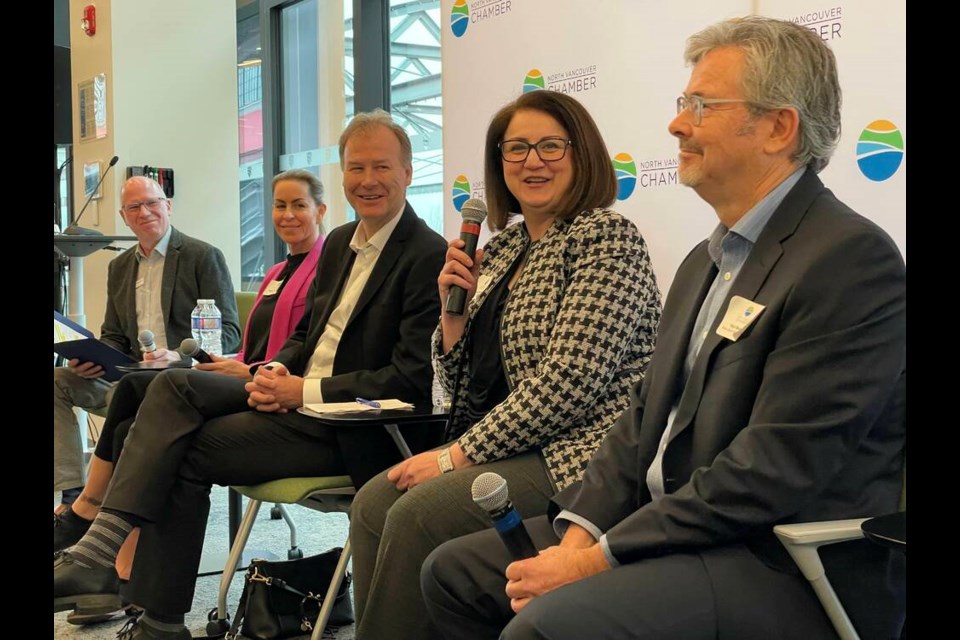An economic recession is on the horizon and both interest rates and prices are likely to remain high for a while, says Bryan Yu, chief economist for Central 1 Credit Union.
But that’s not a reason to panic.
With any luck, the recession will be temporary, said Yu, and there’s even reason for optimism.
“It’s not 2008/2009 when we saw a three per cent drop in GDP for Canada. It’s not the 80s when unemployment rolls into the 12 per cent range,” he said. “We do expect this to improve and normalize over the course of 2023.”
Yu made his comments during a keynote speech on “The state of business” on the North Shore in 2023, presented by the North Vancouver Chamber before a sold-out crowd at Capilano University’s Lonsdale campus Tuesday morning.
The event marked one of the first general events held in-person for chamber members since the pandemic pushed many events online over the past two to three years of living with COVID-19.
Rising interest rates, inflation create challenges
But as the pandemic’s impact on business fades, rising inflation and interest rate hikes by the Bank of Canada have created new challenges for business.
The Canadian inflation rate is sitting at about 6.5 per cent now, said Yu.
But “the patterns are inching closer towards normal,” he said.
Yu predicted inflation might stabilize at about four per cent – still a lot higher than the Bank of Canada’s target rate of two per cent.
That means there’s still some pain ahead, he said, as consumers and businesses delay major spending in response to interest rates and higher prices – which aren’t expected to fall anytime soon. Adding to the problem, “B.C. households have the highest debt to income ratios in Canada,” he said. “We are more sensitive to a rate hike than other areas of Canada.”
A panel of North Shore business leaders – including Grouse Mountain president Michael Cameron, Fibreco Export president Megan Owen-Evans, Sunrise Senior Living present Sepideh Ebrahimi and Aqua-Guard Spill Response co-founder Nigel Bennett – spoke at the event about current challengers facing businesses and how they’ve been meeting those.
Labour shortages still a problem
Labour shortages remain a problem, they said.
“It’s really difficult to get nurses here,” said Ebrahimi, adding it took her three years to hire a registered nurse. Foreign nurses often work as care aides while going through the process to become licensed to work as nurses in B.C., she said, but added “that process takes a long time. It’s not easy.”
At Grouse Mountain, the business went from 800 employees down to 34 in just three weeks in March 2020, said Cameron, and has been building back the labour force ever since.
The ski hill hires a lot of students but is heavily reliant on foreign workers who come to Canada on visas available to young people, he said. During COVID “they weren’t coming over” he said, which led to restaurants at Grouse having to curtail their hours. Now “it looks like we’ve turned a corner,” he said, with both young foreigners who work at Grouse and customers travelling again.
Owen-Evans said her company has also had to make sure it’s investing in employees to keep their skills current and be willing to look at flexible hours, work-from-home options and better benefits. “People will go to the next business that’s offering something you don’t,” she said.
Lack of trades workers impact capital projects
Scarcity of workers in the trades has also put “a huge uncertainty” in capital investment, said Owen-Evans.
Inflation and global supply chain issues have added to challenges facing businesses, said Bennett.
“The price of aluminum and steel has tripled,” said Bennett.
Delays in manufacturing and delivery of parts has also impacted capital projects, said Cameron.
Traffic issues continue to affect North Shore businesses, said all panelists.
Some employees who don’t live on the North Shore quit after a month or two “because they can’t take it,” said Cameron. “We warn people about the commute.”
“Most of our staff can’t afford to live in North Vancouver,” said Ebrahimi. “Weekend transit is not always reliable.”
Yu said demographic change that is behind the worker shortage isn’t going away, but increased immigration will help. Ottawa has set immigration targets at about 500,000 newcomers per year – about 40 per cent higher than pre-pandemic levels, he said. Pre-2020, in a good year, Metro Vancouver would see about 30,000 new immigrants, said Yu. This year that number will be between 40,000 and 45,000 people, he said. “It’s going to be a significant boost.”


